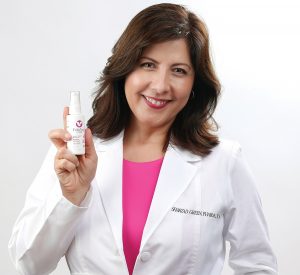
Sharzad Green
October is National Breast Cancer Awareness month.
Breast cancer is the second most common cancer in American women. Skin cancer is the first. For every eight women in the United States, one will be diagnosed with breast cancer during her lifetime.
In 2017, the American Cancer Society estimated the following for breast cancer in the United States:
- About 252,710 new cases of invasive breast cancer diagnosis.
- About 63,410 new cases of carcinoma in situ (CIS) diagnosis (CIS is non-invasive and is the earliest form of breast cancer).
- About 40,610 women died from breast cancer in 2017.
Depressing, isn’t it? However, according to the American Cancer Society, there are more than 3.1 million breast cancer survivors in the U.S. as of 2017. And globally, there are an estimated 9.3 million breast cancer survivors. Yeah for that.
One of the most sensitive issues during and after breast cancer treatment has to do with a woman’s sexuality. In particular, vaginal dryness and vulvovaginal atrophy (VVA) are common problems in these women. Chemotherapy and radiation often change a premenopausal woman’s hormone levels and vaginal health.
Following breast cancer, women generally should not be given hormones. Some doctors prescribe low-dose vaginal estrogen, which can be partially absorbed into the blood. This can potentially stimulate breast cancer cells, the last thing you need after everything you have gone through.
One of the solutions to this problem involves using vaginal moisturizers. A vaginal moisturizer is a cream (such as FabuVag) used to restore moisture in the vagina. It is vital to help bring your vaginal tissue to health after chemotherapy and radiation.
When I was in the process of formulating FabuVag vaginal moisturizer, I chose only natural ingredients, such as fennel, vitamin E, aloe vera, lavender oil, shea butter and coconut oil, which can have wonderful soothing benefits on sensitive tissue that has been damaged by harsh chemicals and lack of hormones.
I also avoided certain chemicals and ingredients, such as:
- parabens
- perfumes
- synthetic dyes and coloring
- glycerin
- petrolatum
- phthalates
- propylene glycol
Read labels carefully and, when in doubt, ask an expert. For more information, feel free to contact Sharzad Green, PharmD.
Dr. Sharzad Green is a graduate of the University of Arizona College of Pharmacy and specializes in bio-identical hormone therapy and natural alternatives for men and women. You may contact her at (480) 264-7600, or via email at info@naturalvaginalsolutions.com.

